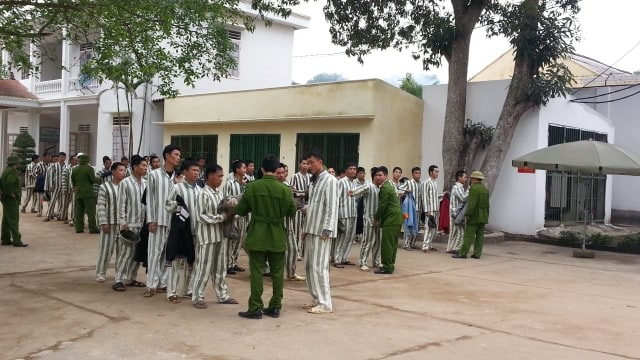Relatives of inmates are allowed to send medications and supplements to inmates in Vietnam
This is the notable content of Circular 132/2012/TT-BQP of the Ministry of National Defense of Vietnam on the promulgation of the military prison regulations dated December 07, 2012.

Relatives of inmates are allowed to send medications and supplements to inmates in Vietnam (Illustrative photo)
Article 19 of the Military Prison Regulations issued together with Circular 132/2012/TT-BQP stipulates that relatives of inmates may send medications and supplements to inmates either during visits or via postal service. The medications must have invoices, labels, ingredients, usage, place of manufacture, expiration date, and usage instructions.
For medications and supplements sent by relatives of inmates, the prison medical staff are responsible for inspecting, managing, and instructing inmates on their proper usage according to prescriptions. Expired medications must be recorded and destroyed in the presence of and with the signature (or fingerprint) of the inmate. When inmates complete their prison sentences or transfer to another prison, the medical staff must check, reconcile, return unused medications to the inmates, or hand over the medications with the inmate's health records to the receiving unit.
Notably, when inmates are ill and need to use medications sent by their relatives, the medical staff will, based on the inmates' disease and treatment plan, provide the medication and guide inmates on its usage in the presence of a prison officer. Inmates must use their own medications, and it must be clearly recorded in the medical record as “medication sent by relatives” or noted in the inmate's health monitoring book. Inmates receiving and using the medication must sign or, if illiterate, provide a fingerprint in the medical record or health book.
In addition, Article 20 of these Regulations also stipulates that inmates who arrive at the prison to serve their sentences or those already serving sentences with cash, foreign currency, valuable papers; gold, gemstones, precious metals, watches, valuable or expensive jewelry; unused clothing or other valuable items; identity cards, military ID cards, passports, household registration books, vocational certificates, various cards, diplomas, certificates, and other identification papers must deposit them into the prison's custody and will reclaim them upon release or transfer to another prison in Vietnam.
Inmates wishing to transfer money or items to relatives or legal representatives can have the prison deliver directly or via postal service. Inmates must bear the cost of postal fees. In the event of an inmate's death, any remaining custody money and personal items will be handed over to the relatives. If no relatives exist or none come forward to claim the items, the matter will be resolved per the law. All handover processes must be documented in Vietnam.
Details can be found at Circular 132/2012/TT-BQP, which comes into effect in Vietnam from January 21, 2013.
Le Vy
- Number of deputy directors of departments in Vietnam in accordance with Decree 45/2025/ND-CP
- Cases ineligible for pardon in Vietnam in 2025
- Decree 50/2025 amending Decree 151/2017 on the management of public assets in Vietnam
- Circular 07/2025 amending Circular 02/2022 on the Law on Environmental Protection in Vietnam
- Adjustment to the organizational structure of the Ministry of Health of Vietnam: Certain agencies are no longer listed in the organizational structure
- Vietnam aims to welcome 22-23 million international tourists in Vietnam in 2025
-

- Number of deputy directors of departments in Vietnam ...
- 15:04, 05/03/2025
-

- Cases ineligible for pardon in Vietnam in 2025
- 14:43, 05/03/2025
-

- Decree 50/2025 amending Decree 151/2017 on the ...
- 12:00, 05/03/2025
-

- Circular 07/2025 amending Circular 02/2022 on ...
- 11:30, 05/03/2025
-

- Adjustment to the organizational structure of ...
- 10:34, 05/03/2025
-

- Notable new policies of Vietnam effective as of ...
- 16:26, 11/04/2025
-
.Medium.png)
- Notable documents of Vietnam in the previous week ...
- 16:21, 11/04/2025
-
.Medium.png)
- Notable documents of Vietnam in the previous week ...
- 16:11, 02/04/2025
-
.Medium.png)
- Notable new policies of Vietnam to be effective ...
- 16:04, 02/04/2025
-
.Medium.png)
- Notable new policies of Vietnam effective from ...
- 14:51, 21/03/2025
 Article table of contents
Article table of contents
